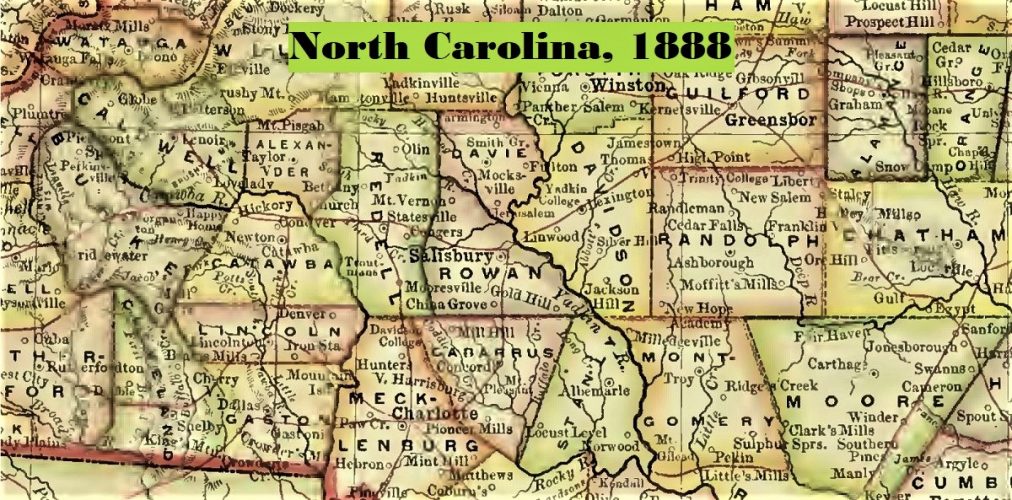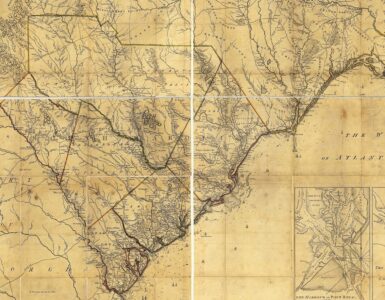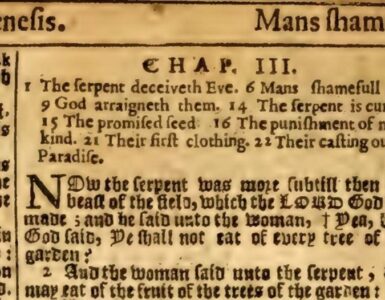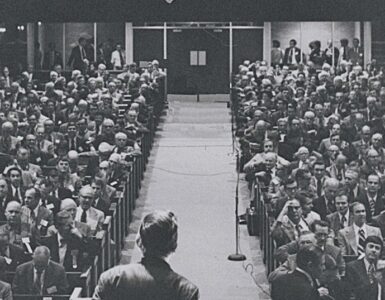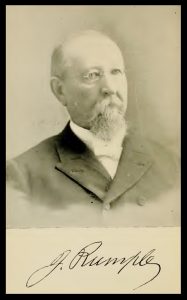 Cabarrus County was established in 1792 and named for Stephen Cabarrus who was the speaker of the North Carolina House of Commons. The county holds an important place in American history because gold was discovered at Reed Gold Mine in 1799, and until the California Gold Rush fifty years later, North Carolina was the leading source of the precious metal in the nation. Cabarrus is one of several counties along the wagon road from Pennsylvania that brought Scots-Irish settlers to the Carolinas. Presbyterian churches were started along the settlers’ route beginning in the mid-eighteenth century. One of those early churches in Cabarrus County is Bethpage which was organized 1794 and it would become important in the life of Jethro Rumple.
Cabarrus County was established in 1792 and named for Stephen Cabarrus who was the speaker of the North Carolina House of Commons. The county holds an important place in American history because gold was discovered at Reed Gold Mine in 1799, and until the California Gold Rush fifty years later, North Carolina was the leading source of the precious metal in the nation. Cabarrus is one of several counties along the wagon road from Pennsylvania that brought Scots-Irish settlers to the Carolinas. Presbyterian churches were started along the settlers’ route beginning in the mid-eighteenth century. One of those early churches in Cabarrus County is Bethpage which was organized 1794 and it would become important in the life of Jethro Rumple.
Jethro was born on his grandfather’s farm to Mary Winecoff Rumple, March 10, 1827, but was raised after his mother’s death by his brother Levi and his wife Christina. His early studies occurred in an “old field school” which was a subscription school used before North Carolina passed its public-school law in 1839. The term “old field” came about from constructing schools on worn-out farmland. Jethro’s later education was guided by Pastor James E. Morrison of Bethpage Church. His collegiate studies were completed at Davidson when he graduated with honors in 1850.
The time of Jethro’s call to the ministry is not known, but while teaching in a classical school for about three years he began theological studies with Rev. Walter Wellington Pharr (1813-1886) of the Poplar Tent Church. Jethro headed to South Carolina in 1854 to formally prepare for the ministry at Columbia Seminary and during that time he was licensed to preach by Concord Presbytery. He was ordained by the same presbytery and installed pastor of Providence and Sharon Churches in Mecklenburg County, January 9, 1857. After four years he was installed pastor of First Presbyterian Church, Salisbury, November 24, 1860. When he began his new ministry the church membership was less than a hundred, but by the end of his forty-plus years of pastoral work, the congregation had increased four-fold.
During his years in Salisbury, Rumple not only served First Church but was also involved in other church ministries and community work. He was the stated clerk of Concord Presbytery until he resigned in 1868 because his work as chairman of the presbytery’s Sustenation Committee was requiring too much time to properly do both jobs. After the Civil War, ministers salaries in the South were often inadequate if not unpaid, so the Sustenation Committee provided funds to help the shepherds in need. A particularly important event during Rumple’s tenure was establishment of Mecklenburg Presbytery from a portion of Concord Presbytery in October 1869. One key point of discussion leading up to the division was how would the oversight of Davidson College relate to the new presbytery, which was an issue of concern particularly to Rumple because he was on Davidson’s board. In the later years of his ministry he often supplied churches in the mountains including the Blowing Rock mission that was organized in 1887 and named Rumple Memorial Presbyterian Church in later years.
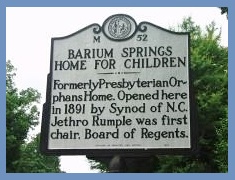
Following the Civil War there were destitute widows as well as families with fathers unable to work because of battle injuries. Households struggled in the South where Reconstruction had a residual influence for a number of years. One of the most sad results of the war was the many children orphaned due to the loss of both parents. Sometimes children were sorted among kin for care, but others were simply abandoned to fend for themselves. The Synod of North Carolina responded to the need and Dr. Rumple spearheaded the founding of Barium Springs Orphanage and was its first chairman of the board. When the original orphanage property burned in later years, the replacement facility was named Rumple Hall in his honor in 1916. He was the secretary of Davidson College’s board of trustees, 1878-1905, having been elected a trustee in 1858; he was also a director of Union Seminary, 1863-1906, including two years as the board president. Even though Pastor Rumple had not taught school in years, he continued to support education for a number of years as a member of the public-school board, and he worked to provide access to books as director of the Salisbury Library Association. In 1882 the University of North Carolina honored him with the Doctor of Divinity.
Dr. Rumple and Jane Elizabeth Wharton were married in 1857. She was a trained musician and for several years operated in Salisbury a music school. The Rumples had three children that survived infancy. Watson Wharton born in 1859, James Wharton Walker born in 1861, and Linda Lee. Their son Watson died in 1877 from an injury received when he was hit by the ball while playing baseball during his senior year at Davidson. James completed his studies at Davidson and became an attorney but he drowned in the Shenandoah River in 1893. Linda Lee married C. G. Vardell, D.D., who was pastor of the First Presbyterian Church in New Bern until be became president of Flora McDonald College in Red Springs in 1896. It was at the home of Linda Lee that Dr. Rumple passed away on January 20, 1906 after several months of declining health. He is buried in the Chestnut Hill Cemetery in Salisbury next to Jane who predeceased him July 6, 1902. Pastor Rumple delivered his last sermon on October 8, 1905, “Let all your things be done with charity” (1 Cor. 16:14). It was a fitting final proclamation of the Word by one who showed charity to many and helped when needed.
Jethro Rumple’s publications show his interest in history. He published A History of Rowan County, 1881, and he wrote a series of articles between 1878 and 1887 on the history of Presbyterianism in his state for North Carolina Presbyterian. He was a contributor to and coeditor of Alfred Nevin’s Encyclopedia of the Presbyterian Church in the United States of America, 1884. In 1887 he edited First Semi-Centenary Celebration of Davidson College, Addresses, Historical and Commemorative, Delivered at the Annual Commencement, Wednesday, June 13, 1887, which includes a forty-six page address by Rumple on the history of Davidson.
An article about Rumple written by George Raynor provides the assessment of one woman concerning Pastor Rumple’s sermons and his leading worship services.
From three-quarters to a full hour was allowed for the sermon, old fashioned with its bones of structure fully visible, its fourthlys and fifthlys in sequence. When at last the sermon was over and the last hymn was sung, Dr. Rumple would end the final prayer with a warm “Aye-men” in a tone that sounded as if he were glad to be done; and I would be glad with him (p. 50).
The woman’s opinion of Rumple’s sermons is not kind, but there may well have been others who believed a precisely organized, well thought out sermon extending as long as an hour in a service ending with a definitive “Amen” were attributes of his pastoral ministry. Ministers vary in their preaching skills but what Scripture tells a congregant to judge is whether the pastor’s message teaches the truth of God’s Word. She could have benefitted from reading Acts 17:17 where Jews hearing Paul and Silas preach in the synagogue of Berea “received the word with all eagerness, examining the Scriptures daily to see if these things were so” (Acts 17:11). Truth is presented in sermons so the Holy Spirit can use it to illuminate understanding and bring hearers to salvation and sanctification. Alfred Nevin in his Presbyterian Encyclopedia said of Rumple’s preaching that “As a preacher, he is earnest, clear, tender and able. As the stores of his learning increase, so does his preaching possess additional freshness and power.”
A gracious assessment of the life and ministry of Dr. Rumple from his memorial adopted by his fellow presbyters of the Synod of North Carolina.
As pastor and preacher, and presbyter, he was a zealous and faithful laborer. In the judicatories of the Church which he habitually attended, he was a wise counsellor and an active member. As a Trustee of Davidson College and of Union Theological Seminary for many years, he could always be depended on to perform efficiently any duty devolved upon him. As the first President of Barium Springs Orphans Home, he did more for founding and sustaining this institution than any member of our Synod. In his private and social relations, brother Rumple was a typical Christian gentleman, hospitable towards his brethren, considerate of their views and feelings of others, and genial in all his social intercourse. He had his personal and family sorrows, but they never led him to murmur at the orderings of Providence nor to become morose in disposition, nur tocea.se active work for the Master. Down to the last months of his life, he held official positions, and amid growing infirmities discharged his duties with conscientious fidelity.
Barry Waugh
Notes—The header map section is from Appleton’s Atlas of the United States, New York, 1888. It is unfortunate that the name “Jethro” is associated with not being very bright ever since the days of sixth-grade-educated Jethro Bodine of the Beverly Hillbillies. It is a noble name because it was the name of Moses’ wise father in law ( יִתְרוֹ ) who advised him to establish elders over groups of the Hebrews for more efficient leadership. Flora Macdonald College merged with another Presbyterian institution in 1958 to become what is currently St. Andrews University in Laurinburg, North Carolina. The classmates and Philanthropic Society of Davidson College erected a monument for Watson W. Rumple, who was a month short of his eighteenth birthday when he died from his injury. The biographical entry written by Dr. Rumple’s daughter, Linda Lee Vardell, which prefaces the 1916 edition of his 1881 first edition book, A History of Rowan County North Carolina, was helpful. The George Raynor article mentioned is titled, “Jethro Rumple: Pastor and Author,” and it is found on pages 46-52 of Piedmont Passages: VII, Religion and Education in Piedmont Carolina, 1991. The information on Watson Rumple’s death was located in The Danbury Reporter, North Carolina, February 1, 1877, page 2, and The Alamance Gleaner, January 23, 1877. The biography in Dictionary of North Carolina Biography, edited by W. S. Powell, Vol. 5, P to S, UNC Press, 1994, by Neil R. McGeachy is good; McGeachy also wrote Confronted by Challenge: A History of the Presbytery of Concord, 1795-1973, 1985, which includes several transcriptions from presbytery minutes and associated documents.


